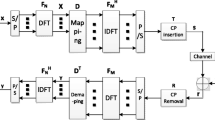Abstract
This paper proposes a hybrid OFDM/TDMA (Orthogonal Frequency Division Multiplexing/Time Division Multiple Access) scheduling method to obtain fine bit-rate granularity in wireless personal area networks (WPANs). A new blind adaptive receiver structure that combats the effects of inter-carrier interference (ICI) caused by users’ frequency offsets is also proposed to improve the system throughput. The proposed blind adaptive receiver is based on constant modulus (CM) criterion and requires no more knowledge of the frequency offsets of interferers’ signals than the conventional receiver. The advantage of our countermeasure is that frequency-guard or redundant data is not needed, thus the throughput performance will not degrade, and estimation of the frequency offset is also no longer necessary. In order to make the adaptive receiver realizable, we develop a soft-constraint-satisfaction (SCS) based algorithm to achieve faster convergence. Simulation results show that our proposal is capable of significantly reducing the influence of ICI.
Similar content being viewed by others
References
“Wireless Medium Access Control (MAC) and Physical Layer (PHY) Specifications for High Rate Wireless Personal Area Networks (WPANs),” IEEE Std 802.15.3™-2003.
“Multi-band OFDM Physical Layer Proposal Update,” IEEE 802.15-04/0122r4. Available at: http://www.ieee802.org/15/pub/TG3a.html
Y.-H. Tseng et al., Maximum Traffic Scheduling and Capacity Analysis for IEEE 802.15.3 High Data Rate MAC Protocol. Vehicular Technology Conference, 2003, pp. 1678–1682, VTC 2003-Fall.
A. García et al., “H-OFDM design for Wireless Personal Area Communications,” Proc. of IST Mobile & Wireless Comm. Summit, Portugal, Vol. I, pp. 93–97, June 2003.
A. M. Tonello et al., Analysis of the uplink of an asynchronous multi-user DMT OFDMA system impaired by time offsets, frequency offsets, and multi-path fading. In Proc. VTC2000 Fall, Vol. 3, pp. 1094–1099, Boston, MA, 2000.
Y. Zhao S. Häggman (July 2001) ArticleTitleIntercarrier interference self-cancellation scheme for OFDM mobile communication systems IEEE Transactions on Communications 49 IssueID7 1185–1191
P. H. Moose (October 1994) ArticleTitleA technique for orthogonal frequency division multiplexing frequency offset correction IEEE Transactions on Communications 42 IssueID10 2908–2914 Occurrence Handle10.1109/26.328961
M. Anandpara et al., Inter-carrier interference cancellation for OFDM system. available at: http://www.ece.utexas.edu/~wireless/EE381K11_Spring03/projects/6.3.pdf
D. Huang K. B. Letaief (2003) Carrier Frequency Offsets Mitigation for Broadband OFDM in a Multiuser Environment in PIMRC Barcelona Spain 1149–1153
J. Míguez L. Castedo (August 1998) ArticleTitleA linearly constrained constant modulus approach to blind adaptive multi-user interference suppression IEEE Communication Letters 2 IssueID8 217–219 Occurrence Handle10.1109/4234.709436
C. Xu G. Feng (September 2000) ArticleTitleComments on ‘a linearly constrained constant modulus approach to blind adaptive multiuser interference suppression’ IEEE Communication Letters 4 IssueID9 280–282 Occurrence Handle10.1109/4234.873486
O. Dabeer E. Masry (June 2003) ArticleTitleConvergence analysis of the constant modulus algorithm IEEE Transactions on Information Theory 49 IssueID6 1147–1464 Occurrence Handle10.1109/TIT.2003.811903
B. Baykal J. A. Chambers (April 1999) ArticleTitleA new family of blind adaptive equalization algorithms IEEE Communication Letters 3 IssueID4 109–110 Occurrence Handle10.1109/4234.757204
O. Tanrikulu et al. (1998) ArticleTitleSoft constraint satisfaction (SCS) blind channel equalization algorithms International Journal of Adaptive Control Signal Process 12 117–134 Occurrence Handle10.1002/(SICI)1099-1115(199803)12:2<117::AID-ACS483>3.0.CO;2-Y
J. Zhu E. Zhang (2000) ArticleTitleBlind Multiuser detector based on SCS algorithm Journal of NanJing University of Posts and Telecommunications 23 IssueID3 11–14




